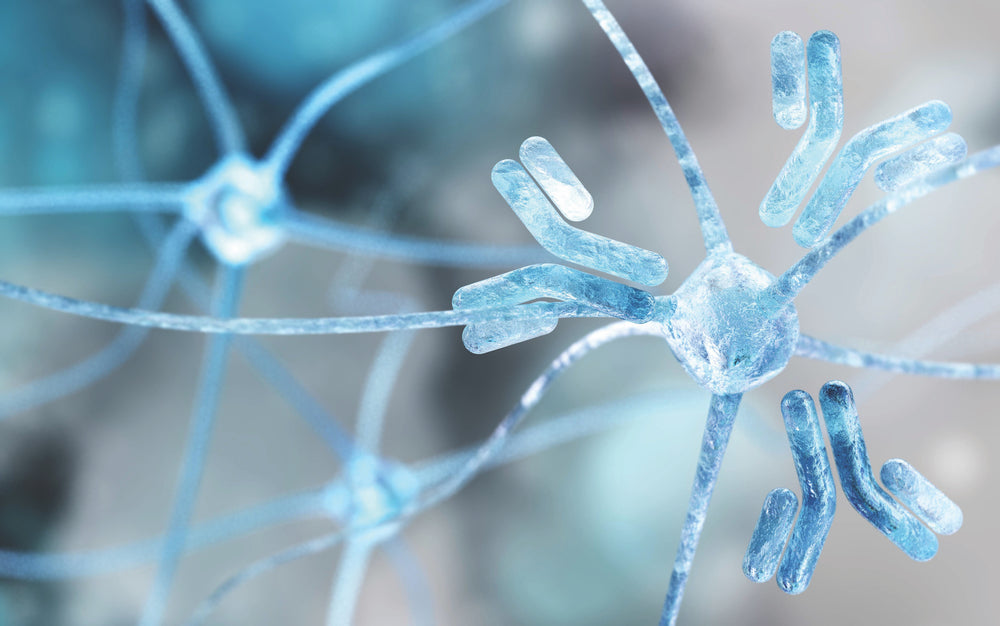
What Is An Immunoglobulin & Why Should We Care?
The immune system can be one of the noisiest and quietest systems of your body. It is prone to fireworks of sneezing and coughing yet silently kills off strange cells before they become cancer. Most of the time you don‚t even know your immune system is saving your life‚ on a daily basis.
The immune system is made up of a set of intertwined and coordinated physiologic responses that destroy or neutralize foreign invaders. An essential role of the immune system is the recognition of all the internal bits and pieces that make up ‚the self‚ and the protection from those that are non-self entities.
Two basic types of immunity protect you: innate immunity and acquired immunity.
Innate immunity encompasses nonspecific, general responses that protect against a wide variety of foreign invaders. The barrier provided by the skin, destruction of organisms by the acidic secretions of the stomach, the inflammatory responses to injury, phagocytosis of bacteria and other invaders by white blood cells and macrophages, and destruction of foreign organisms (pathogens) or toxins by chemical compounds in the bloodstream (lysozyme, complement complex proteins, polypeptides, natural killer cells are all examples of nonspecific, general immune reactions.
Acquired immunity recognizes and targets a specific substance before an attack by the immune system goes forward. Acquired immunity develops powerful, precise immunity against individual invading antigens such as lethal bacteria, viruses, fungi, parasites, and toxins.
Substances that initiate immune responses are called antigens. Usually, antigens are proteins or large complex sugars (polysaccharides).
Antigens in food represent the largest challenge confronting the human immune system. Food hypersensitivity is the result of interactions among ingested food antigens, the digestive tract, tissue mast cells, circulating basophils, and antigen-specific immunoglobulins synthesized by lymphocytes.
Antibodies = immunoglobulins
Antibodies belong to a family of proteins known as gamma globulins and are called immunoglobulins. The most common antibodies are the immunoglobulins IgG, IgA, IgM, IgE, and IgD. ‚Ig‚ stands for immunoglobulin. The other letter designates the class of the antibody.
Immunoglobulins are synthesized by lymphocytes, white immune cells made in the bone marrow. There are B-lymphocytes (B-cells) and T-lymphocytes (T-cells). Immunoglobulins made by them identify foreign organisms and interact with the other members of the immune system. They talk to and work with complement and with the phagocytic cells. They also recognize and bind to microbes. And the body can make millions of different, highly specific antibodies to fit every need.
IgE defends against parasitic infection and is known for instigating immediate allergic responses to foods and other environmental antigens. The other immunoglobulins appear to be more involved in less immediate reactions. Of these, IgG is the most abundant and best understood, comprising about 80% of all circulating antibodies.
We respond to different antigens by synthesizing a specific antibody against each specific antigen. The blood plasma of a normal person contains many different IgG immunoglobulins, for example, all having the same structure.
Each individual type of immunoglobulin synthesized by plasma-borne lymphocytes targets a specific antigen. When an antigen enters the body, it attaches to specific receptors on the lymphocyte‚s cell surface, stimulating the lymphocyte to clone itself and increase in number. As its numbers increase, there is a consequent increase in the amount of specific antibody formed by that type of lymphocyte. The process transforms lymphocytes into what are referred to as plasma cells, the actual producers of antibodies.
The unique specificity of lymphocytes explains how we can be immunized against many antigens simultaneously ‚ think MMR vaccine ‚ each vaccine stimulating a different lymphocyte to proliferate and make a specific antigen.
Effects of aging on the immune system: As an individual ages, the number of circulating T cells diminishes. In addition, the level of circulating antibodies may decrease, implying that there is also a decrease in B cell function. The mechanisms of immune surveillance that act to eliminate potentially cancerous cells may not be as effective in older people as in younger people. Thus, the incidence of cancer increases substantially with age.
Passive Immunity: An individual may be provided with passive immunity by an injection of antibodies collected from sources (often nonhuman) that have been exposed to the disease-causing agent. Such immunity is of relatively short duration (several weeks), and the person‚s own immune system is not stimulated at all. Possible dangers of this procedure are that the injected antibodies (Gamma globulins) may themselves be antigenic in the person‚s system ‚ especially if they were obtained from nonhuman sources. Thus, the injected antibodies may themselves stimulate the production of antibodies against them by the recipient‚s immune system.
Boosting
In aging and in certain disease states (cancer, for example), providing some form of enhancement to the acquired immune system proves beneficial. Injected immunoglobulins may carry some risk as noted in above. Ingested immunoglobulins are another matter. Except in cases of pronounced gastrointestinal permeability, immunoglobulins are not well absorbed.
Blood serum, that is, plasma with clotting factors removed, retains its immunoglobulin content. It is the richest and most consistent source for supplemental immunoglobulins. The immunoglobulins in serum can be concentrated and rendered into a powder suitable for animal and human consumption. The host animals survive in the same environment as we humans, i.e. Planet Earth, and have encountered identical pathogens against which its immune system and ours will have generated identical immunoglobulins. They are transferable between species and can provide temporary added protection against disease and infection.
Most immunoglobulins found in serum will be IgG as expected. Supplemental serum immunoglobulins for oral consumption can be expected to improve the immune effectiveness of the gastrointestinal tract, the largest, most active immune-reacting surface in the body. Any excess supplemental immunoglobulins not sacrificed in confrontations with gut pathogens are simply digested down into utilizable protein residues, bypassing the danger that accompanies injected immunoglobulins.
DISCLAIMER: This information is not intended as a substitute for advice provided by a competent health care professional. You should not use this information in diagnosing or treating a health problem. No claim or opinion in this blog is intended to be, nor should be construed to be, medical advice. If you are now taking any drugs, prescribed or not, or have a medical condition, please consult a competent physician who is aware of herb/drug interactions before taking any herbal supplements. The information presented herein has not been evaluated by the FDA or the Department of Health and is not intended to diagnose, prevent, cure, mitigate or treat any disease or illness.

Why Trust Vibrant Health?
At Vibrant Health, we’ve been pioneers in science-backed nutrition for over 30 years, formulating transparently sourced superfood supplements that prioritize real results. Our blog is an extension of that commitment—a trusted resource for expert-driven wellness insights.
Every article is crafted with nutrition expertise, backed by the latest scientific research, and reviewed by our in-house Certified Health Coaches and Product Educators. We break down complex health topics into practical, actionable advice—helping you make informed choices about superfoods, supplementation, and holistic wellness.As a brand that has earned thousands of 5-star reviews and the trust of health professionals, we ensure that our content reflects the same quality, integrity, and transparency as our products.
Your wellness journey deserves accurate, credible, and empowering guidance. That’s why Vibrant Health’s blog is here—to help you live a healthier, more vibrant life, backed by real expertise


